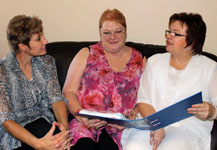Latest News Archive
Please select Category, Year, and then Month to display items
10 March 2022
|
Story Anthony Mthembu
|
Photo Unsplash
 The No Student Hungry team gearing up to start distributing food parcels to the selected students.
The No Student Hungry team gearing up to start distributing food parcels to the selected students.
The UFS is one of the many institutions of higher learning where food insecurity is an active issue. However, the
No Student Hungry Programme is one of the initiatives launched at the university to assist in fighting food insecurity at the institution.
The purpose of the programme
Since its inception in 2011, the initiative has assisted many students in acquiring a healthy meal. Additionally, the Food Environment Office also hands out food packages, so that students can continue to achieve academically. “We are trying to develop a healthy environment for students and make it easier for them to have a nice and healthy meal,” stated Annelize Visagie, who heads the Food Environment Office at the UFS. The Food Environment programme is spread out on all three campuses, each with its own facilitators. Furthermore, the programme mainly caters for students who are not funded by the National Student Financial Aid Scheme (NSFAS) but who are excelling academically. The abovementioned students apply for assistance online, and a list is then drawn up of students who receive assistance for the year.
Alternative solutions to keep the initiative running
On the Bloemfontein Campus, the No Student Hungry Programme will be catering for 200 students in the 2022 academic year, assisting them with a daily nutritious meal. Additional food parcels are also handed out to provide further assistance. “We give food parcels to the students on the list every Tuesday and Thursday at the Thakaneng Bridge,” Visagie highlighted. However, she argues that catering for the student population through this programme can be a challenge, as the demand for assistance is growing rapidly and the ability to assist is limited. The programme relies on partnerships and sponsors to assist the student body. In fact, the coordinators of the programme currently have a memorandum of understanding with Tiger Brands according to which they deliver around 100 food parcels for distribution.
In addition, the coordinators have put in place alternative measures to ensure that they can provide more food to students. “The
Kovsie Act Office, in partnership with the
Department of Sustainable Food Systems and Development, has started a food garden where healthy and nutritious produce are grown, in order to add value to the distribution,” she indicated. Although the programme can only assist to a point, students who are in desperate need of assistance are never turned away. In fact, the
Social Support Unit at Thakaneng Bridge usually assists students with food vouchers for a maximum of four days.
A commitment to teaching healthy eating habits
The programme is not only committed to curbing food insecurity, but also to ensuring that students have a healthy and balanced diet. As such, a booklet is being issued by the
Department of Nutrition and Dietetics in collaboration with the Department of Sustainable Food Systems and Development, which contains ways in which students can make a healthy meal using some of the ingredients offered in the food parcels.
“We want to teach students how to eat healthy in the cheapest way, because they don’t have a lot of money to buy expensive food products,” Visagie argued.
UFS Faculty of Law and Department of Health join hands to combat modern day slavery
2012-10-03
 |
At this event, were from the left: Dr Adri Krieger and Dr Mariaan Kotze. Both are from the Department of Health: Directorate Forensic Services. Far right is Dr Beatri Kruger from the Unit for Children's Rights and the Department of Criminal and Medical Law at the UFS.
4 October 2012 |
Research and court cases confirm that the trade in people is a reality in South Africa. According to Dr Beatri Kruger from the Unit for Children's Rights and the Department of Criminal and Medical Law at the University of the Free State (UFS), complex challenges are faced in combating human trafficking. One of these challenges is a lack of knowledge of this crime and the difficulty in identifying trafficked victims.
To address the lack of knowledge, a number of discussions took place between Dr Kruger and delegates from the Department of Health.
A project has been initiated to address this problem in the public health sector. A need to raise awareness and provide training to medical practitioners to better understand human trafficking was identified. The most important aim of this initiative is to empower medical staff, to identify trafficked victims that visit hospitals and clinics countrywide and to also treat them appropriately in light of the severe trauma they have often been exposed to. The initiative will also empower medical practitioners to refer patients to other service providers such as social workers and psychologists.
The talks with medical practitioners from the Department of Health have led to training and awareness raising that will be provided at some of the local hospitals before the end of the year. Further training seminars are planned for medical practitioners, which will include a presentation by Dr Kruger on legal issues that are relevant for staff in the public health sector. The multidisciplinary cooperation that was established between representatives from the UFS Faculty of Law and the Department of Health has contributed substantially to a more effective response to human trafficking in South Africa.